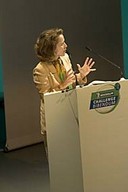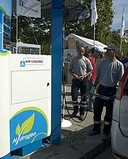Our Man in Paris @ The 2006 Michelin Challenge Bibendum - Chapter 4
 |
Michelin Challenge Bibendum , Day Four
By Thom Cannell
Detroit Bureau
The Auto Channel
On the final day of Michelin Challenge Bibendum many of the 400-plus journalists from more than 40 countries have returned home. They miss an
 |
Our first speaker is the Minister of Industry for France, M. François Loos. He expresses France’s intent to deliver 5-7% of its transportation energy from biofuel by 2010, an ambitious goal. Frances current 26 biofuel plants will be followed by second generation production facilities that do not utilize food crops as feedstock.
He is followed by the director, Office of Transportation & Air Quality, EPA USA, Ms. Margo Oge. She speaks to the headline issues of energy costs and global warming
 |
The US has set a goal of 7.5 billion gallons of renewable fuels, 5% of our total use, by 2012. Ms. Oge says countries must make a national commitment (to alternative fuels) as “market forces alone will not make differences until it is too late.” She further states the governments do not do a good job of picking winning technologies and that there is wisdom in seeing vehicles and fuels as a system.
Jan-Roger Linn, Principal of Environ Corporation asserts that new technologies can cut both consumption and greenhouse gas emissions by a factor of 2. These include stop-start engines, flexible fuel vehicles, vehicles that run on compressed natural gas and the advanced fuels built from coal or biological materials. “We are not running out of oil, we are running out of cheap oil,” he says. Expect continued advancements in internal combustion engines, hybrids that plug into the grid every night to simulate pure electric vehicles, and better electric batteries to contribute to an incredibly diverse energy future. For now liquid fuels perfectly match the distribution system, while locally (perhaps in-home) compressed natural gas offers an alternative fuel available today.
Two other presentations interest me greatly, Brazil’s ethanol economy and natural gas.
Dr. Silvio Crestana, CEO of the Brazilian Agricultural Research Corporation (EMBRAPA) discusses the remarkable 44% renewable fuels used in Brazil today. Based mostly on sugar cane, ethanol not only replaces, flexibly, gasoline, but is produced at $0.15/liter while reducing the amount of carbon in our atmosphere. Brazil is increasing its production of biodiesel and will make B5 (5% biodiesel) mandatory after 2013. Brazil is exporting ethanol and technology to Japan.
The European Natural Gas Vehicles Association’s Director M. Jeffery Seisler then presents an impassioned speech on how cheap, easy, and .
 |
After the conference, seated in a bistro near la Tour Eiffel, I’m savoring draft beer in 90+°F heat. I’m thinking about what I’ve seen and heard over the last three days of the 2006 Michelin Challenge Bibendum.
Much of the message is the traffic I see from my roadside seat. Diesels represent more than 50% of European sales, and I cannot tell gas from diesel in car or medium truck. I see no smoke, smell no fumes, hear no annoying rattles except from larger displacement busses. These vehicles are
 |
From my perch I spy one Aston Martin, one Mercedes M-Class, vast numbers of B-sized cars and many A-sized or City cars that would (OK—could) fulfill a majority of needs for families in the US if we changed attitudes. That’s a paradigm shift of vast proportions, yet something to contemplate.
Do you need a Tahoe day-to-day or just once a month to tow your boat, or a bi-weekly trip “up North.” Would you consider rental a viable option for those occasions? I really don’t know, not having done the math. Nor have most Americans I know, including friends who are considering replacing a paid-off 18-25 mpg vehicle for one that gets 25-35 mpg. That’s replacing pain-at-the-pump premium of $10-$30/week with a $500 monthly car payment. It may also be an instinctive acknowledgement that the “temporary” price of oil is permanent, that $60/barrel oil is gone forever.
Thirteen remaining North American journalists gather that evening for a farewell to Michelin Challenge Bibendum dinner of traditional French dishes
 |
Me? I’m going to visit the Mayor of Lansing, Michigan and tell him about Swedish biogas, one of the many vital and interesting lessons Challenge Bibendum has offered. I’ll try to convince him that it could be politically, environmentally, and financially beneficial to one community. It is a start.


